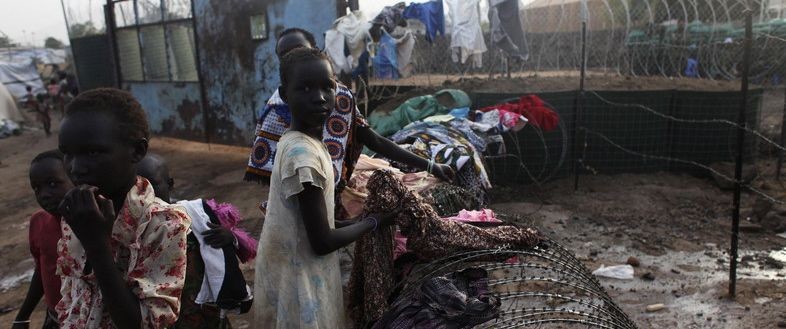The UN Food and Agriculture Organization warns of a ‘major crisis’ as food prices soar in South Sudan’s capital Juba and livelihoods elsewhere such as farming, herding and trade continue to be disrupted by conflict.
“Signs are beginning to emerge of a major food security crisis as food reserves are exhausted in areas isolated by the conflict and markets in Juba see soaring prices for staple foods (sorghum) and run out of key commodities (powdered milk, sugar),” reports FAO.
FAO classifies 1.1 million at a pre-famine state of ‘emergency’ food insecurity, with 2.1 million facing ‘acute’ food insecurity, more than triple pre-crisis estimates.
In Upper Nile State, the UN Humanitarian Air Service reached Malakal with a flight today for the first time since the city came under attack 18 February. Oxfam evacuated four aid workers on the flight, but said it would possibly return as early as Wednesday. The organization worked promoting good hygiene practices to people leaving inside the base.
Oxfam added that since Tuesday it had to “severely scale back its work at the UN base” because violence within the base among civilians living there made it unsafe to continue working.
International Medical Corps told Radio Tamazuj on Saturday their team of 9 staff inside the UNMISS camp in Malakal continued to provide medical services through a clinic next to the Indian Army Hospital, but noted, “the ongoing crisis is certainly limiting our efforts.”
OCHA, the UN Office for the Coordination of Humanitarian Affairs, in a regular situation report on Friday, said that malnutrition screening was carried out last week in Malakal, finding that out of 4,995 children screened under 5 years, 7% were found to have severe acute malnutrition and 18% were found to have moderate acute malnutrition.
Distributing food aid is challenging because “insecurity along commercial supply corridors and has led to the flight of private sector actors, market fragmentation, and food and fuel price inflation,” according to OCHA.
In Majak village in Upper Nile State, 962 children, were screened out of which 32% were identified as having severe acute malnutrition and 43% were found with moderate acute malnutrition.
In Warrap State’s Math Awan village, 1,449 children were screened, finding that 16% had severe acute malnutrition and 16% were moderately acutely malnourished.
The UN Coordination Agency also reported 71 suspected measles cases last week, and 172 the previous week. They said the vaccination campaign managed get to children in previously unreached areas, including 14,620 children in Jonglei’s Walgak area.
Related:
Key humanitarian updates, 19 Feb.
Key humanitarian updates, 14 Feb.
Key humanitarian updates, 12 Feb.
Photo: South Sudanese girls collect their laundry from a barbed wire fence at UNMISS compound in Tongping in Juba, 19 Feb. 2014 (Reuters)




